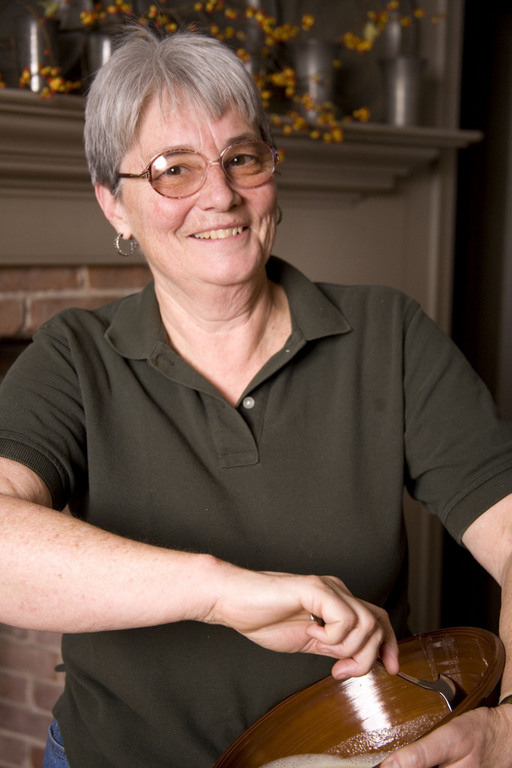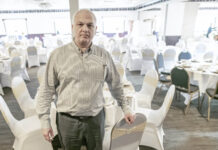
Ellen Madison wakes up early on days she teaches Colonial hearth cooking at her Woody Hill Bed & Breakfast in Westerly, starting the fires in the hearth and beehive oven several hours before guests arrive.
She prepares the roast and sets it in a tin reflector oven by the fire. Then she starts arranging the ingredients, the cast-iron pots and skillets and other antique cookware needed to transport her guests to the late 1770s and early 1800s.
Madison embraces culinary tourism. She uses it as a tool to generate business in the fall and winter months, when fewer people are traveling to South County to enjoy the beaches.
She draws them in with fresh butternut squash soup, roast turkey, pear chutney, cornbread, Thomas Jefferson’s bread pudding and a taste of George Washington’s alcoholic Fish House Punch.
But participants aren’t required to stay overnight in order to enjoy the four- to six-hour class. In fact, many private cooking parties pay the $45 per person for food and fun, then return to their homes.
Most are interested in food or history or both, Madison said. Some have fireplaces in their homes and want to utilize them for cooking. Some are just looking for a unique way to spend the evening.
Madison doesn’t depend on the novelty to pay her bills. A retired high school English teacher, she uses her bed-and-breakfast’s three bedrooms, the hearth cooking classes and occasional outdoor weddings to supplement her income.
She started the cooking classes after 1994, when she added a “keeping room” to her Colonial-reproduction home. The “keeping room” is the equivalent of today’s living room, only it contains a hearth for cooking, a dining area for eating and a living space for socializing.
Madison took it one step further by adding a tavern cage bar. The bar is a place to store liquor and looks sort of like a teller’s cage in an old bank. They were used in colonial boarding houses to serve liquor to guests and keep valuables safe.
Though she’s been conducting hearth cooking classes for almost 13 years, Madison said, the classes were never as popular as they have become within the past year. The popularity – sparked by a Boston Globe article – resulted in eight classes being booked this winter. That is twice as many as the year before.
“I’m going to ride the wave while it’s here,” she said. “It’s not going to last forever.”
Madison said she didn’t intend for the home – built in 1972 on 20 acres of farmland she inherited from her family – to become a bed-and-breakfast. It happened by accident one summer when she volunteered to take in a few boarders.
Madison has been able to maintain the successful B&B for 17 years since she started making breakfast for boarders. That kind of longevity is unusual in the industry, she said. The key is a loyal base of repeat customers.
People like the B&B because it’s close to Route 1 but you can’t see other houses, she said.
“People feel they are really in the country,” she said. “People feel welcome and they feel comfortable. They feel as though they are coming home.”
But there is some uncertainty as to how long it will last.
Since the fire at The Station, stricter fire codes have been enforced, and Madison said she has felt the effects. She has had to scale back the business by allowing only six guests at a time, as opposed to 10 or more, as she used to when she had all five bedrooms available for accommodation. The cutoff is six people if she wants to adhere to a more lenient code that falls under the variance for bed-and-breakfasts issued in 2005 after an appeal to the R.I. Fire Safety Code Board of Appeal and Review.
“At seven people, a whole new set of codes kicks in,” she said. “An electrician gave an estimate of $10,000 for a new alarm system [as required by the code for seven or more occupancy] … so I’ve chosen not to do that.”
She added: “Bed-and-breakfasts, because we’re such a seasonal business, we just don’t make that back easily.”
And she is not alone. The new fire codes have been a problem for many small businesses in the area, said Myrna George, president of the South County Tourism Council.
Madison said she would keep the business in full operation indefinitely if the fire codes didn’t present such a challenge. Though she will not close completely, she might scale back even more in the next two years.
Madison is scaling back for other reasons as well. She would like to have more free time, she said. She taught for 33 years without ever having a summer off. Now she would like to spend more time gardening.
But she said she will keep the hearth cooking classes running from November through April because “it’s fun.”
And George hopes Madison will stay in business, because “the B&Bs and the inns have been the backbone of accommodations in South County. … The B&Bs in general represent the quality of life we all enjoy.”











